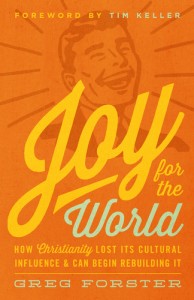Greg Forster for the defense, your honor.
Following my annual tradition, I offer my Independence Day case for hopeful realism about moral consensus in America. Last year I remarked that it was time to start tempering the hope and offering concessions to the realists. This year I offer no such tempering or concessions. The key question at this moment is not how to balance hope and realism, but whether there is any place for hope.
I start by recalling the thought that inspired me in my initial Independence Day reflection:
Ladies and gentlemen of the jury, I defy you to show me any nation in the whole history of this world where that blind, black son of sharecroppers grows up to be Ray Charles….If it’s the good, true and beautiful you’re looking for, a country in which Ray Charles can grow up to be Ray Charles has a lot to offer.
But now it is we who are increasingly the blind ones. As I wrote while my daughter was in surgery:
American culture has a way of defying pessimistic expectations…We expect the sources of tomorrow’s strength to be the same as yesterday’s sources. But yesterday’s sources are always in decline – that’s just how it is in the fallen world. Meanwhile, in the places where we’re not looking, entrepreneurs are inventing new sources of cultural strength and vitality. The signs of decline are always right where you expect to find them; the signs of hope spring up in the last places you expect.
So while we spend all our time debating how a Supreme Court decision is going to destroy the world, we fail to notice that the Walt Disney Corporation – an organization whose power to influence American culture is, frankly, greater than that of the Supreme Court – has become a highly effective purveyor of moral edification.
I’m not pretending that we aren’t in for a rough ride. The recent decisions of the court are going to hurt a lot of people, mostly those they are intended to help. That sucks and it’s going to be hell. But that’s not the question. The question is whether the whole culture moves together in one direction, or if there are also countervailing winds – winds that might actually turn out to be more important.
If you had told me a few years ago that Disney – the great high citadel of Romantic individualism! – would conquer the whole world with a devastating attack on Romantic individualism (a movie whose moral is “love is putting other people’s needs ahead of yours”) and then conquer the whole world again just a year and a half later with yet another devastating attack on Romantic individualism (a movie whose moral I have summarized as “Joy is Life, Sadness is Wisdom”) I’d have said you were bonkers. But there it is.
The bad news is always right where you expect to find it. The good news never is.
Culture is not simple; it defies uniform categorization. And of all the complex interlocking systems that make it up, law is not the most important. Otherwise, why do seemingly “sound” judges keep going the wrong way? If the law were at the top of the culture heap, judges would not show such a pronounced tendency to, as they say, “grow in office.” We’re fools if we think the problem is individual lack of virtue on the part of the judges. They are responsible for their own choices, of course, but that can be true and yet at the same time there can also be valid systemic explanations for their choices. Or, to put it another way, we need to ask not only “did the judges fail?” but “given that judges fail, why do so many fail in this particular, specific way?” The answer is that other forces are more culturally powerful than the law.
Or consider, as we have noted several times on HT, the striking consensus that has emerged among cultural elites that divorce and illegitimacy are destroying the poor. Now, there are two ways people who believe what we believe can respond to that. One is to say, “those elites have adopted a Romantic individualist understanding of what marriage is, and until they repent from that no progress can be made; culture is simple and unitary and straightforward and it all interlocks neatly and there is never, absolutely never, any space for internal contradictions. Therefore this new consensus is of no value.” Or we can say, “here’s an opportunity we can seize upon. Without giving any ground on our principles regarding the definition of marriage, let’s work together with these elites to enact reforms that curtail divorce and illegitimacy. When they discover that these reforms are beneficial, we will then be in a much stronger position to explain to them why those reforms had the effect they had – and thus, over time, destabilize their commitment to a Romantic individualist understanding of what marriage is.”
The real problem is not that the enemies of justice and mercy are enemies of justice and mercy. The real problem is that the friends of justice and mercy are too busy cursing the darkness to seize the candle-lighting opportunities that are right in front of their noses.
I close with a reflection I offered last year in my review of Joseph Bottum’s book, which advocates despair:
Bottum himself—unconsciously, perhaps—shows us again and again why we need hope and how we can live it out…You can especially see it in his magnificent chapter on John Paul II. Bottum takes us from the days Karol Wojtyla spent in January 1945 helping clear a gigantic pile of frozen-solid human excrement out of an abandoned seminary building in Cracow, using nothing but a trowel, to his triumphant return to Poland as pope, and beyond. As Bottum emphasizes time and again, John Paul refused to accept the narrow constraints of what appeared, superficially, to be possible—because of his hope. John Paul saw the unseen layer of the world, and that is why he knew with certainty that the counsels of despair were wrong. By bearing witness to hope, he made the impossible possible.
He was willing to spend days on end chiseling human waste out of an abandoned seminary because that was what it took to prevent Soviet troops from marching in and claiming the building. His Christian hope told him that the structures of a culture will ultimately be occupied not by those who have more guns, but by those who do the hard and undignified work of clearing out the excrement. That hope did not put him to shame…
Perhaps Bottum hasn’t fully internalized his own critique of those narrow-minded sociologists of religion. Perhaps he lacks a strong enough faith to have hope. Or perhaps he just feels it’s beneath his dignity to join those of us who will spend the coming generation chiseling gigantic piles of excrement out of the abandoned buildings of American culture. But if God ever does kindle the spark of hope in Bottum’s heart, we’ve got a trowel waiting for him.
Yes, it’s going to suck. But the shit is not going to scrape itself off the floor of American culture.
Trowel’s waiting. Get to work or get out of the way.







